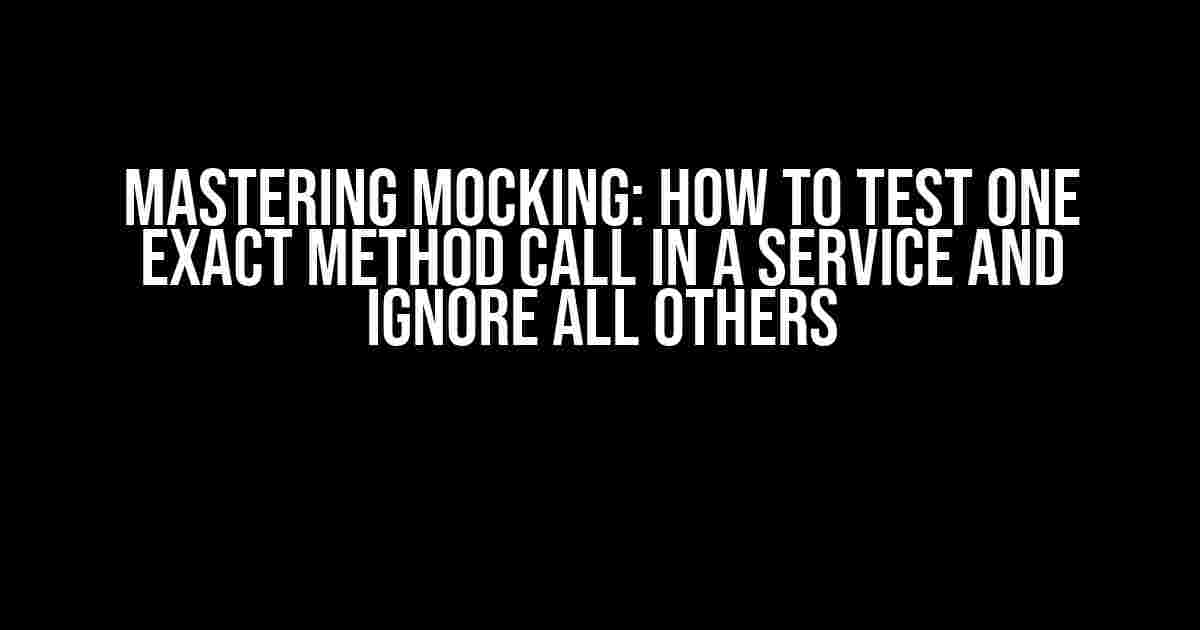Are you tired of writing unit tests that cover every possible scenario, only to find yourself drowning in a sea of complexity? Do you wish there was a way to focus on a single method call in your service and ignore all the others? Look no further! In this article, we’ll dive into the world of mocking and show you how to test one exact method call in a service, while ignoring all others.
The Problem: Testing Services with Multiple Method Calls
Services are a crucial part of modern software development. They encapsulate complex logic, interact with external systems, and provide a layer of abstraction for your application. However, when it comes to testing services, things can get complicated quickly. Imagine you have a service with multiple method calls, each with its own set of dependencies and side effects.
public class MyService {
public void MethodA() {
// Do something complex
}
public void MethodB() {
// Do something else
}
public void MethodC() {
// Do yet another thing
}
}
How do you test a specific method call in this service, while ignoring all the others? You could write a comprehensive test that covers every possible scenario, but that would lead to a test that’s brittle, hard to maintain, and prone to failures.
The Solution: Mocking with Moq
Enter Moq, a popular mocking library for .NET. Moq allows you to create mock objects that mimic the behavior of your services, allowing you to focus on testing specific method calls in isolation.
Installing Moq
Before we dive into the code, make sure you have Moq installed in your test project. You can install it via NuGet:
Install-Package Moq
Creating a Mock Object
Let’s create a mock object for our `MyService` class:
using Moq; var mockService = new Mock<MyService>();
This creates a mock object that we can use to test our service. By default, Moq will throw a `NotSupportedException` when any method is called on the mock object.
Ignoring Method Calls
Now that we have our mock object, let’s ignore all method calls except for the one we’re interested in testing.
mockService.Setup(x => x.MethodA()).Verifiable(); mockService.Setup(x => x.MethodB()).Throws<NotSupportedException>(); mockService.Setup(x => x.MethodC()).Throws<NotSupportedException>();
In this example, we’re telling Moq to:
- Verify that `MethodA()` is called (more on this later)
- Throw a `NotSupportedException` when `MethodB()` is called
- Throw a `NotSupportedException` when `MethodC()` is called
By doing this, we’re effectively ignoring all method calls except for `MethodA()`, which we’ll test in isolation.
Testing the Method Call
Now that we’ve set up our mock object, let’s write a test that verifies `MethodA()` is called:
[Test]
public void MethodA_IsCalled() {
var service = mockService.Object;
service.MethodA();
mockService.Verify(x => x.MethodA(), Times.Once);
}
In this test, we:
- Create an instance of our service using the mock object
- Call `MethodA()` on the service
- Verify that `MethodA()` was called exactly once using Moq’s `Verify` method
If `MethodA()` is not called, the test will fail. If any other method is called, Moq will throw a `NotSupportedException`, and the test will fail.
Verifying Method Calls
In addition to ignoring method calls, we can also verify that specific method calls are made with specific arguments.
[Test]
public void MethodA_IsCalledWithArgument() {
var service = mockService.Object;
service.MethodA("argument");
mockService.Verify(x => x.MethodA("argument"), Times.Once);
}
In this test, we:
- Call `MethodA()` with a specific argument (“argument”)
- Verify that `MethodA()` was called with the exact same argument using Moq’s `Verify` method
If `MethodA()` is not called with the correct argument, the test will fail.
Conclusion
In this article, we’ve learned how to test one exact method call in a service and ignore all others using Moq. By creating a mock object and setting up specific method calls, we can focus on testing individual methods in isolation, making our tests more targeted, efficient, and reliable.
With Moq, you can write unit tests that are concise, clear, and easy to maintain. So go ahead, give Moq a try, and start mocking your way to better software development!
| Keyword | Description |
|---|---|
| Moq | A popular mocking library for .NET |
| Mock object | An object that mimics the behavior of a real object |
| Verifiable | Specifies that a method call should be verified |
| Throws | Specifies that a method call should throw an exception |
| Times.Once | Specifies that a method call should be called exactly once |
By following the instructions in this article, you’ll be able to write targeted unit tests that focus on specific method calls in your services, making your tests more efficient, reliable, and maintainable.
Remember, when it comes to testing services, it’s all about focus. By ignoring method calls that aren’t relevant to your test, you can write more concise, clear, and effective tests that get the job done.
Final Thoughts
In conclusion, mastering mocking is a crucial skill for any software developer. By learning how to test one exact method call in a service and ignore all others, you’ll be able to write more targeted, efficient, and reliable unit tests that cover your codebase comprehensively.
So, go ahead, give Moq a try, and start mocking your way to better software development!
Frequently Asked Question
Unit testing can be a breeze, but have you ever found yourself stuck when trying to mock and test a specific method call in a service while ignoring all other method calls? Well, wonder no more! We’ve got you covered with these frequently asked questions and answers.
Q: How do I isolate a specific method call in my service for unit testing?
A: To isolate a specific method call, you can use a mocking library like Mockito or JMockit to create a mock object for your service. Then, use the `when()` method to specify the exact method call you want to test, and ignore all other method calls using `any()` or `anyString()` placeholders.
Q: Can I use a spy to mock a specific method call in my service?
A: Yes, you can use a spy to mock a specific method call in your service. A spy allows you to stub out specific method calls while still calling the real implementation for other methods. This can be useful when you want to isolate a specific method call without affecting the rest of the service’s behavior.
Q: How do I verify that a specific method was called with the correct parameters?
A: To verify that a specific method was called with the correct parameters, you can use a mocking library like Mockito to capture the method call and its parameters. Then, use assertions to verify that the captured parameters match the expected values.
Q: Can I use a test double to mock out a specific method call in my service?
A: Yes, you can use a test double to mock out a specific method call in your service. A test double is a fake object that mimics the behavior of a real object, allowing you to isolate and test specific method calls in isolation.
Q: How do I ignore all other method calls in my service during unit testing?
A: To ignore all other method calls in your service during unit testing, you can use a mocking library like Mockito to stub out all other method calls using the `doNothing()` or `doReturn()` methods. This will prevent any real implementation from being called, allowing you to focus on testing the specific method call you’re interested in.


